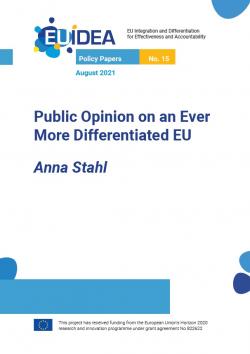Public Opinion on an Ever More Differentiated EU
European integration has been accompanied by differentiation and debates on it are not new. Differentiated integration has received wide scholarly attention and there is a rich and diverse academic literature related to the concept. At the same time, there is the growing belief among European policymakers that more flexibility is needed within the complex EU machinery. To deal with the EU’s unprecedented internal and external challenges, several European leaders have argued that differentiation could contribute to a stronger EU. With the exception of a few studies, the discussion has, however, paid little attention to public opinion. Drawing on the results of an opinion poll conducted between August and September 2020 in the 27 EU member states and four non-EU states, this policy paper addresses this gap in the current political debate. It examines the preferences on European integration among citizens in order to formulate options for differentiated integration as a policy choice. Against this background, the paper proposes a set of three policy recommendations for European policymakers: (i) foster knowledge of differentiated integration among European citizens, (ii) promote and reform the Schengen area and (iii) adopt a tailor-made approach to external differentiation.
-
Details
Rome, IAI, August 2021, 33 p. -
In:
-
Issue
Policy Paper 15
Executive summary
1. Introduction and methodology
2. Internal differentiation: Views from EU citizens
2.1 Public support for DI and underlying patterns
2.1.1 Limited understanding of the concept
2.1.2 Support of DI and general attitudes towards integration
2.2 Public opinion and variation across policy areas
2.2.1 The EMU
2.2.2 Schengen
2.2.3 EU defence policy and cooperation with third countries
2.3 The differentiation-integration nexus in times of crises
2.3.1 Economic crises
2.3.2 Security-related crises
2.3.3 The so-called “immigration and refugee crisis”
3. An external perspective on differentiation: Views from non-EU citizens
3.1 General support for cooperation with the EU
3.2 Variation across policy areas
3.3 Cooperation with selected EU countries
Conclusion and policy recommendations
References
Annex: Questionnaire



